Principles of Project Management: Analysis of Success and Failure
VerifiedAdded on 2023/01/18
|6
|1033
|39
Report
AI Summary
This report delves into the core principles of project management, outlining effective procedures and key knowledge areas crucial for project success. It begins by detailing the application of these procedures, methods, and knowledge areas, which include project integration, scope management, time management, cost management, quality management, human resource management, and communications management. The report then examines the factors that contribute to project success, such as user involvement, executive support, clear requirements, proper planning, and realistic expectations, while also exploring the factors leading to project failure, including resource shortages, unrealistic expectations, and technical illiteracy. Finally, the report discusses the conditions under which project management practices may not be effectively executed, such as a lack of committed sponsorship and organizational involvement. The report concludes by referencing relevant academic sources to support its findings and recommendations.
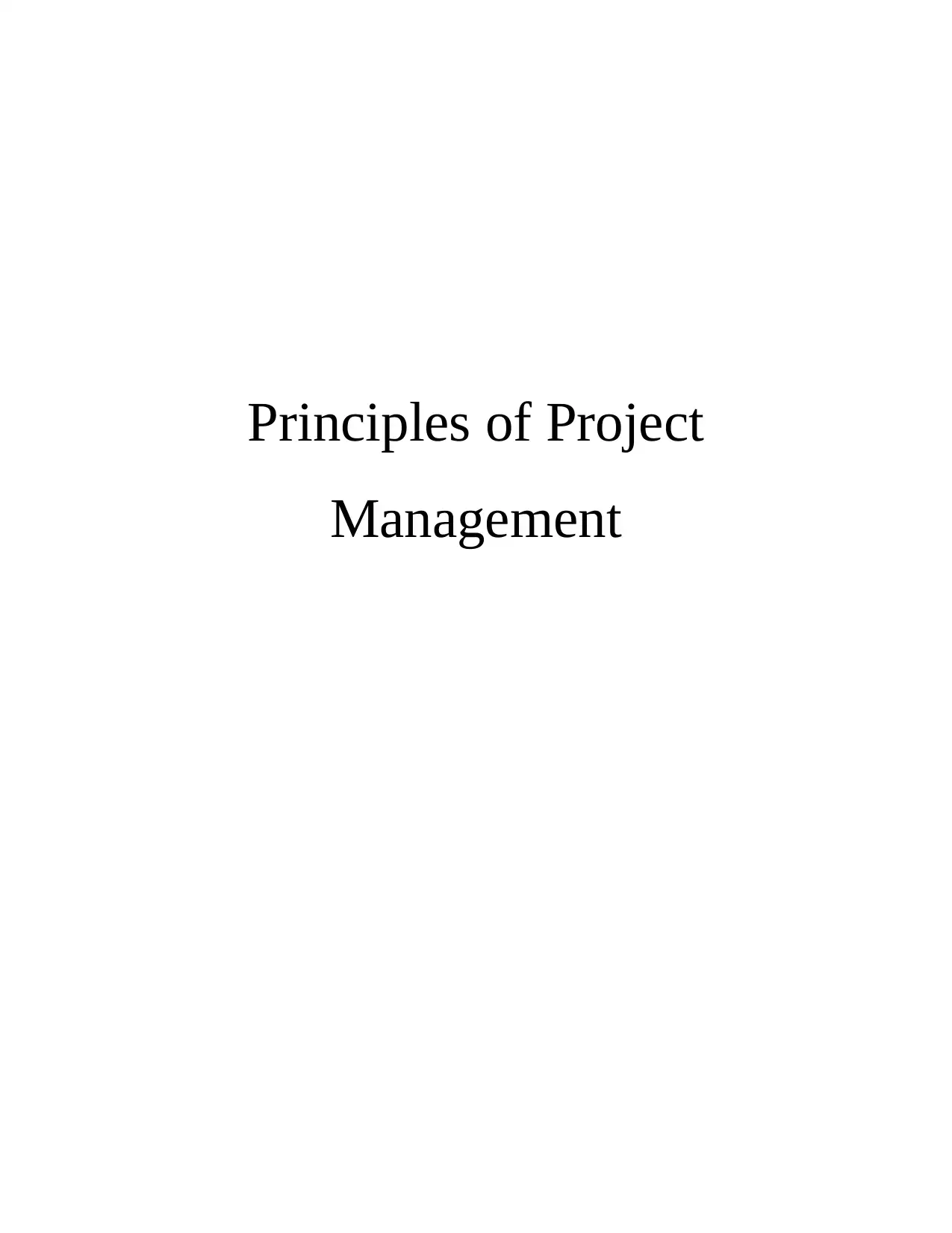
Principles of Project
Management
Management
Paraphrase This Document
Need a fresh take? Get an instant paraphrase of this document with our AI Paraphraser
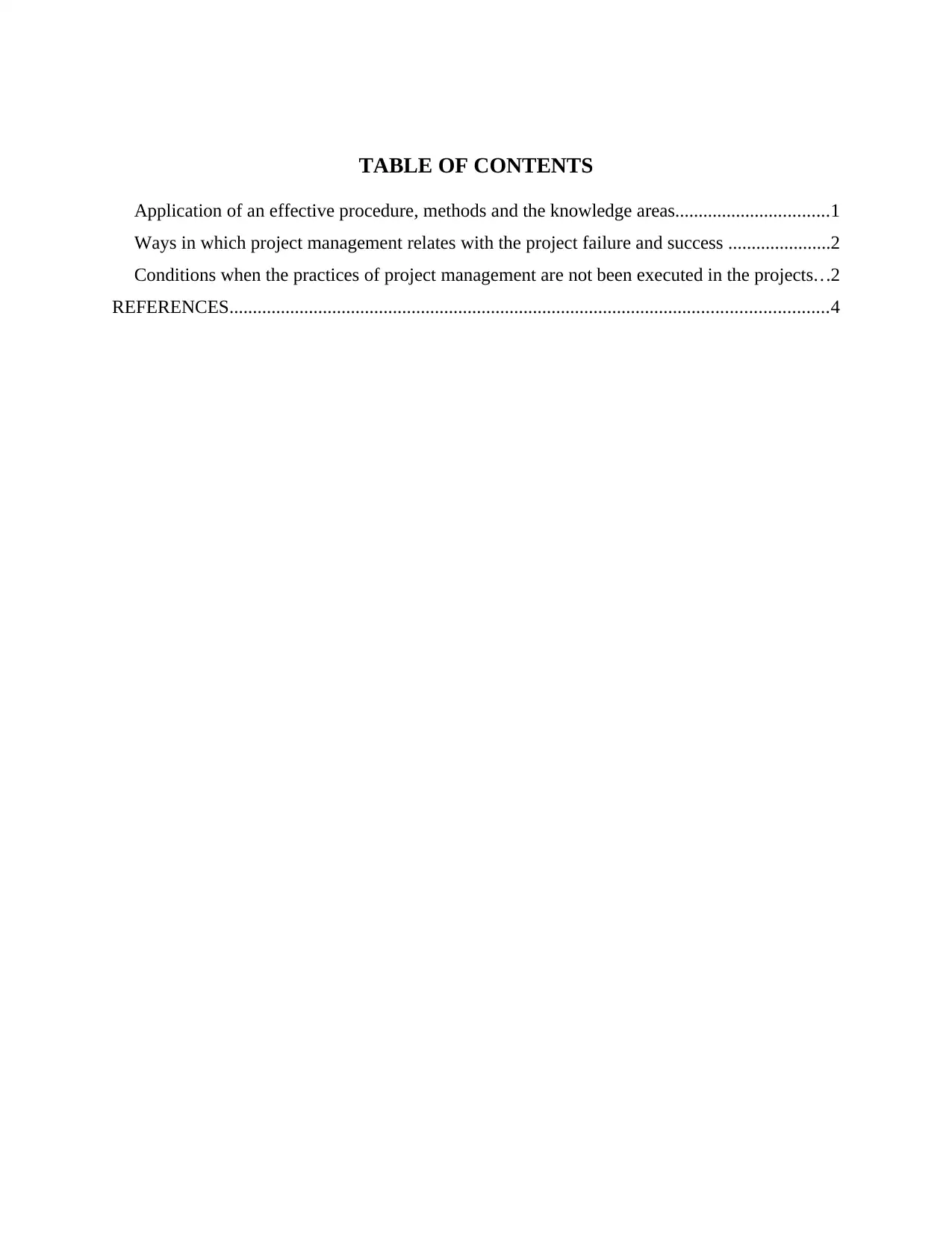
TABLE OF CONTENTS
Application of an effective procedure, methods and the knowledge areas.................................1
Ways in which project management relates with the project failure and success ......................2
Conditions when the practices of project management are not been executed in the projects...2
REFERENCES................................................................................................................................4
Application of an effective procedure, methods and the knowledge areas.................................1
Ways in which project management relates with the project failure and success ......................2
Conditions when the practices of project management are not been executed in the projects...2
REFERENCES................................................................................................................................4
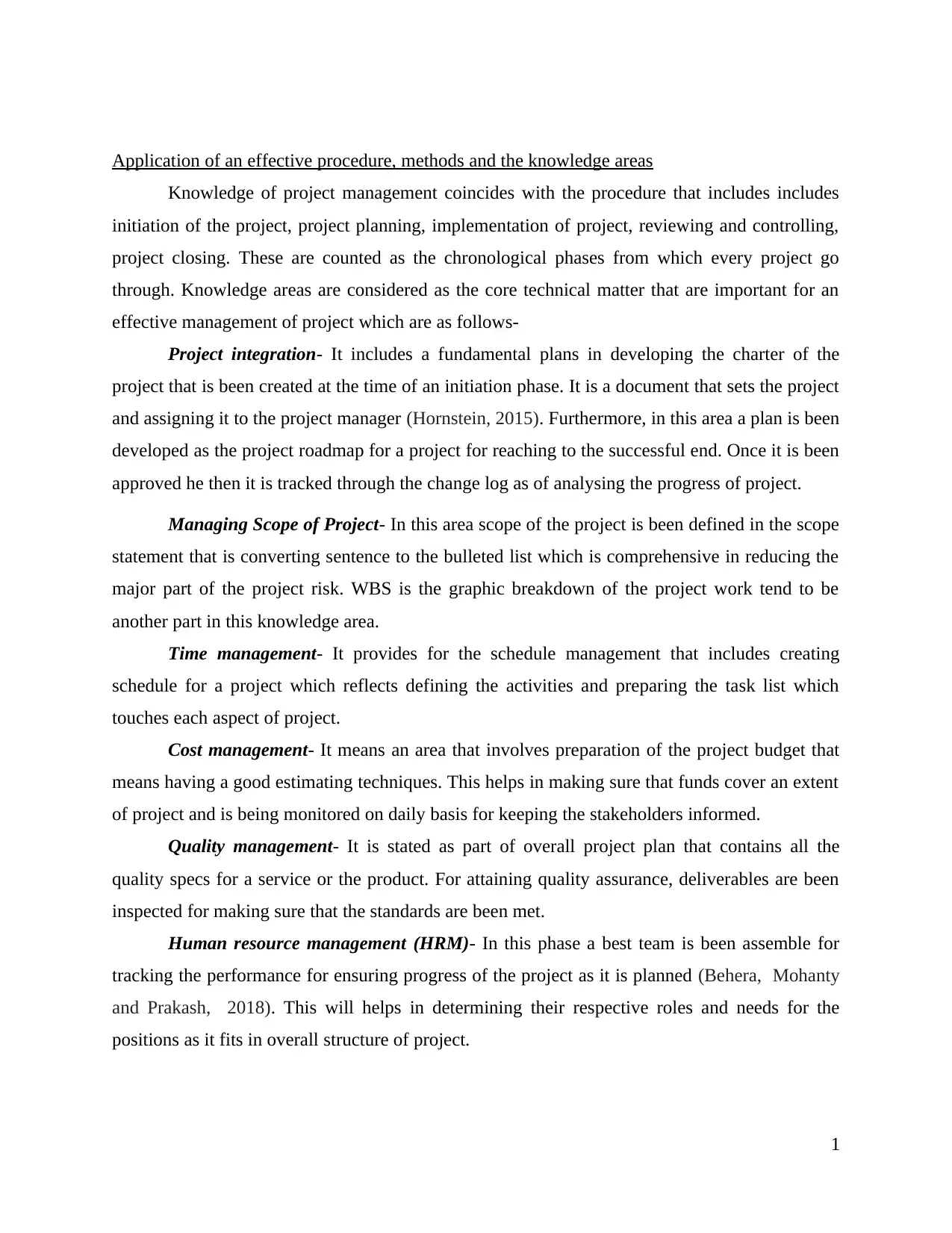
Application of an effective procedure, methods and the knowledge areas
Knowledge of project management coincides with the procedure that includes includes
initiation of the project, project planning, implementation of project, reviewing and controlling,
project closing. These are counted as the chronological phases from which every project go
through. Knowledge areas are considered as the core technical matter that are important for an
effective management of project which are as follows-
Project integration- It includes a fundamental plans in developing the charter of the
project that is been created at the time of an initiation phase. It is a document that sets the project
and assigning it to the project manager (Hornstein, 2015). Furthermore, in this area a plan is been
developed as the project roadmap for a project for reaching to the successful end. Once it is been
approved he then it is tracked through the change log as of analysing the progress of project.
Managing Scope of Project- In this area scope of the project is been defined in the scope
statement that is converting sentence to the bulleted list which is comprehensive in reducing the
major part of the project risk. WBS is the graphic breakdown of the project work tend to be
another part in this knowledge area.
Time management- It provides for the schedule management that includes creating
schedule for a project which reflects defining the activities and preparing the task list which
touches each aspect of project.
Cost management- It means an area that involves preparation of the project budget that
means having a good estimating techniques. This helps in making sure that funds cover an extent
of project and is being monitored on daily basis for keeping the stakeholders informed.
Quality management- It is stated as part of overall project plan that contains all the
quality specs for a service or the product. For attaining quality assurance, deliverables are been
inspected for making sure that the standards are been met.
Human resource management (HRM)- In this phase a best team is been assemble for
tracking the performance for ensuring progress of the project as it is planned (Behera, Mohanty
and Prakash, 2018). This will helps in determining their respective roles and needs for the
positions as it fits in overall structure of project.
1
Knowledge of project management coincides with the procedure that includes includes
initiation of the project, project planning, implementation of project, reviewing and controlling,
project closing. These are counted as the chronological phases from which every project go
through. Knowledge areas are considered as the core technical matter that are important for an
effective management of project which are as follows-
Project integration- It includes a fundamental plans in developing the charter of the
project that is been created at the time of an initiation phase. It is a document that sets the project
and assigning it to the project manager (Hornstein, 2015). Furthermore, in this area a plan is been
developed as the project roadmap for a project for reaching to the successful end. Once it is been
approved he then it is tracked through the change log as of analysing the progress of project.
Managing Scope of Project- In this area scope of the project is been defined in the scope
statement that is converting sentence to the bulleted list which is comprehensive in reducing the
major part of the project risk. WBS is the graphic breakdown of the project work tend to be
another part in this knowledge area.
Time management- It provides for the schedule management that includes creating
schedule for a project which reflects defining the activities and preparing the task list which
touches each aspect of project.
Cost management- It means an area that involves preparation of the project budget that
means having a good estimating techniques. This helps in making sure that funds cover an extent
of project and is being monitored on daily basis for keeping the stakeholders informed.
Quality management- It is stated as part of overall project plan that contains all the
quality specs for a service or the product. For attaining quality assurance, deliverables are been
inspected for making sure that the standards are been met.
Human resource management (HRM)- In this phase a best team is been assemble for
tracking the performance for ensuring progress of the project as it is planned (Behera, Mohanty
and Prakash, 2018). This will helps in determining their respective roles and needs for the
positions as it fits in overall structure of project.
1
⊘ This is a preview!⊘
Do you want full access?
Subscribe today to unlock all pages.

Trusted by 1+ million students worldwide
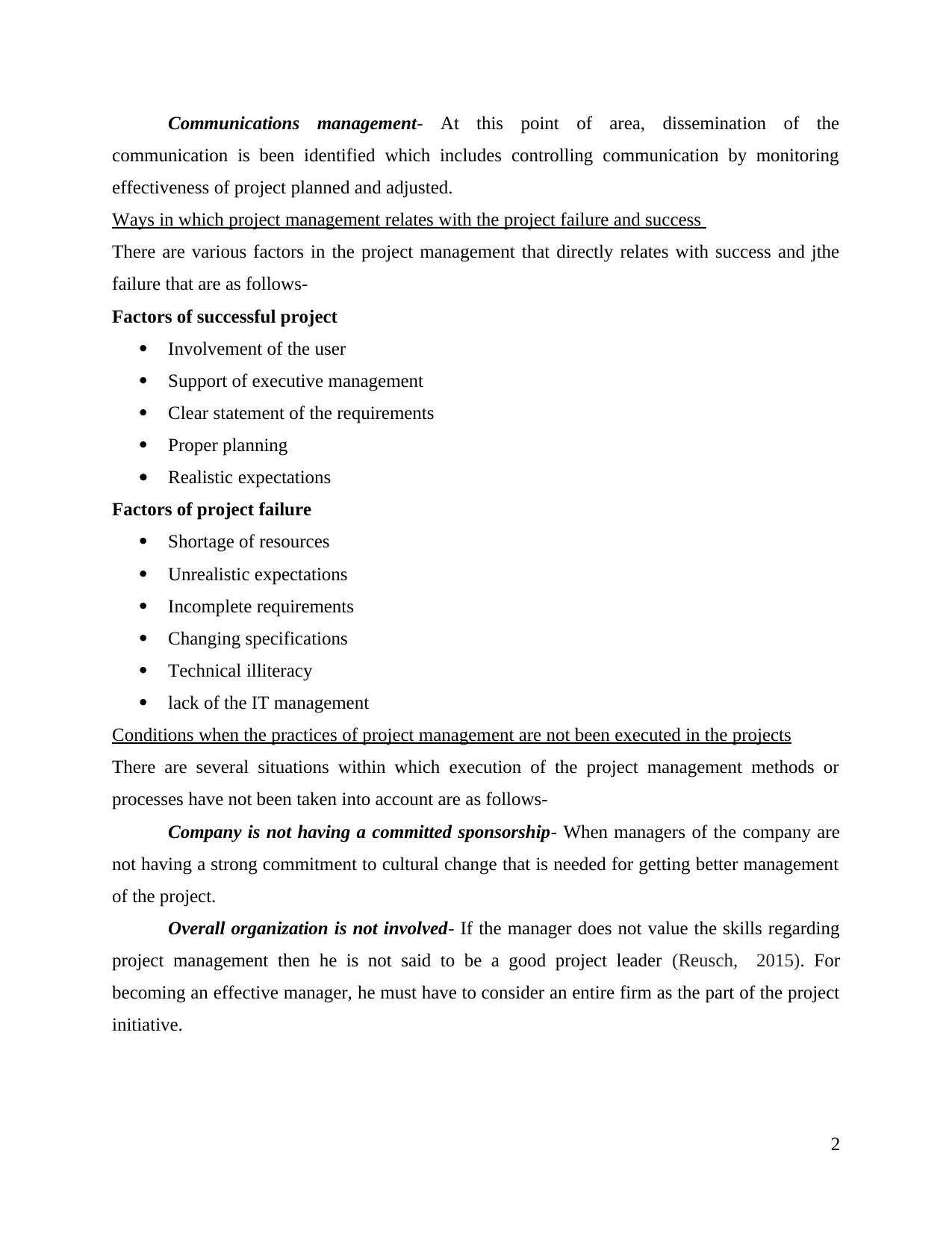
Communications management- At this point of area, dissemination of the
communication is been identified which includes controlling communication by monitoring
effectiveness of project planned and adjusted.
Ways in which project management relates with the project failure and success
There are various factors in the project management that directly relates with success and jthe
failure that are as follows-
Factors of successful project
Involvement of the user
Support of executive management
Clear statement of the requirements
Proper planning
Realistic expectations
Factors of project failure
Shortage of resources
Unrealistic expectations
Incomplete requirements
Changing specifications
Technical illiteracy
lack of the IT management
Conditions when the practices of project management are not been executed in the projects
There are several situations within which execution of the project management methods or
processes have not been taken into account are as follows-
Company is not having a committed sponsorship- When managers of the company are
not having a strong commitment to cultural change that is needed for getting better management
of the project.
Overall organization is not involved- If the manager does not value the skills regarding
project management then he is not said to be a good project leader (Reusch, 2015). For
becoming an effective manager, he must have to consider an entire firm as the part of the project
initiative.
2
communication is been identified which includes controlling communication by monitoring
effectiveness of project planned and adjusted.
Ways in which project management relates with the project failure and success
There are various factors in the project management that directly relates with success and jthe
failure that are as follows-
Factors of successful project
Involvement of the user
Support of executive management
Clear statement of the requirements
Proper planning
Realistic expectations
Factors of project failure
Shortage of resources
Unrealistic expectations
Incomplete requirements
Changing specifications
Technical illiteracy
lack of the IT management
Conditions when the practices of project management are not been executed in the projects
There are several situations within which execution of the project management methods or
processes have not been taken into account are as follows-
Company is not having a committed sponsorship- When managers of the company are
not having a strong commitment to cultural change that is needed for getting better management
of the project.
Overall organization is not involved- If the manager does not value the skills regarding
project management then he is not said to be a good project leader (Reusch, 2015). For
becoming an effective manager, he must have to consider an entire firm as the part of the project
initiative.
2
Paraphrase This Document
Need a fresh take? Get an instant paraphrase of this document with our AI Paraphraser
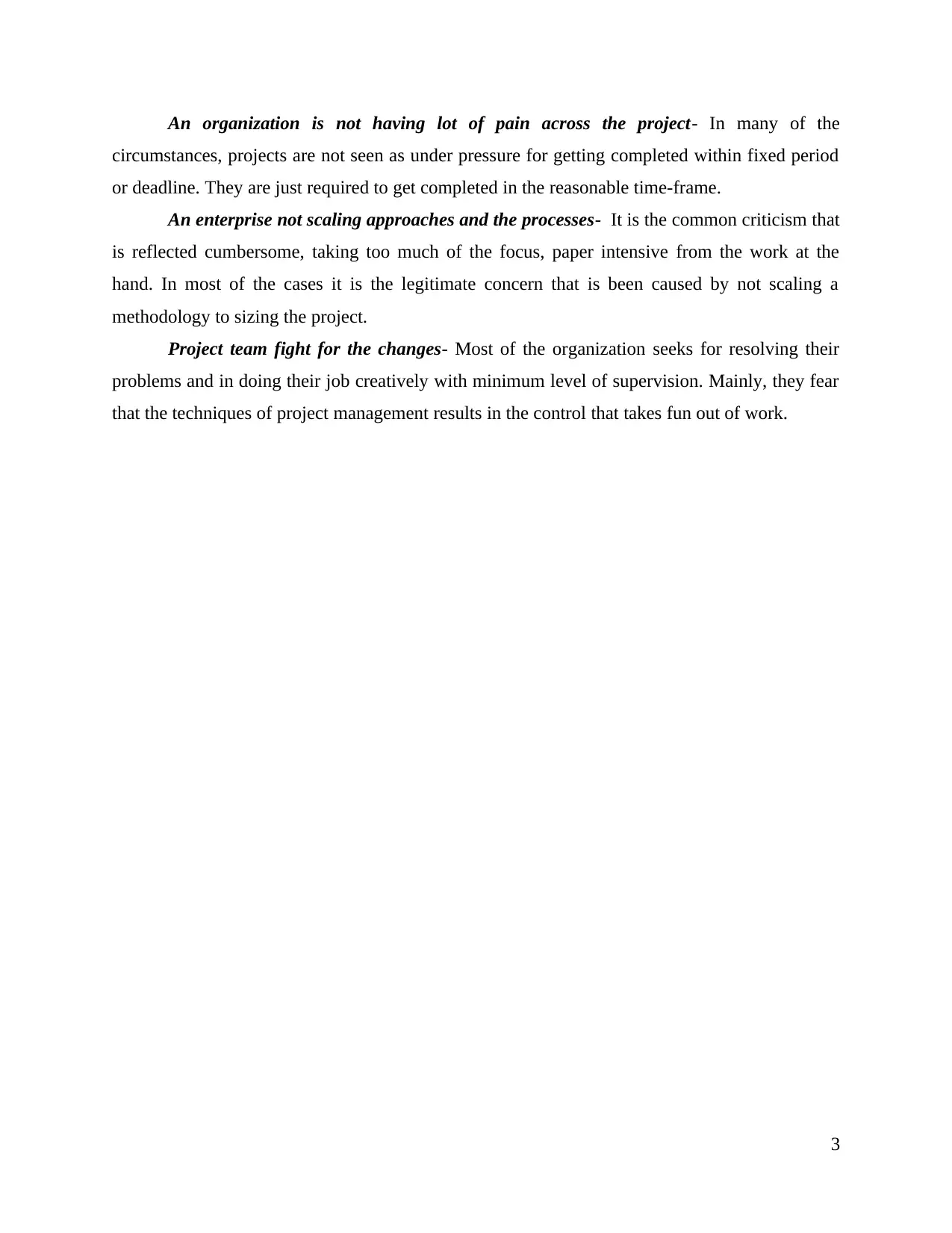
An organization is not having lot of pain across the project- In many of the
circumstances, projects are not seen as under pressure for getting completed within fixed period
or deadline. They are just required to get completed in the reasonable time-frame.
An enterprise not scaling approaches and the processes- It is the common criticism that
is reflected cumbersome, taking too much of the focus, paper intensive from the work at the
hand. In most of the cases it is the legitimate concern that is been caused by not scaling a
methodology to sizing the project.
Project team fight for the changes- Most of the organization seeks for resolving their
problems and in doing their job creatively with minimum level of supervision. Mainly, they fear
that the techniques of project management results in the control that takes fun out of work.
3
circumstances, projects are not seen as under pressure for getting completed within fixed period
or deadline. They are just required to get completed in the reasonable time-frame.
An enterprise not scaling approaches and the processes- It is the common criticism that
is reflected cumbersome, taking too much of the focus, paper intensive from the work at the
hand. In most of the cases it is the legitimate concern that is been caused by not scaling a
methodology to sizing the project.
Project team fight for the changes- Most of the organization seeks for resolving their
problems and in doing their job creatively with minimum level of supervision. Mainly, they fear
that the techniques of project management results in the control that takes fun out of work.
3
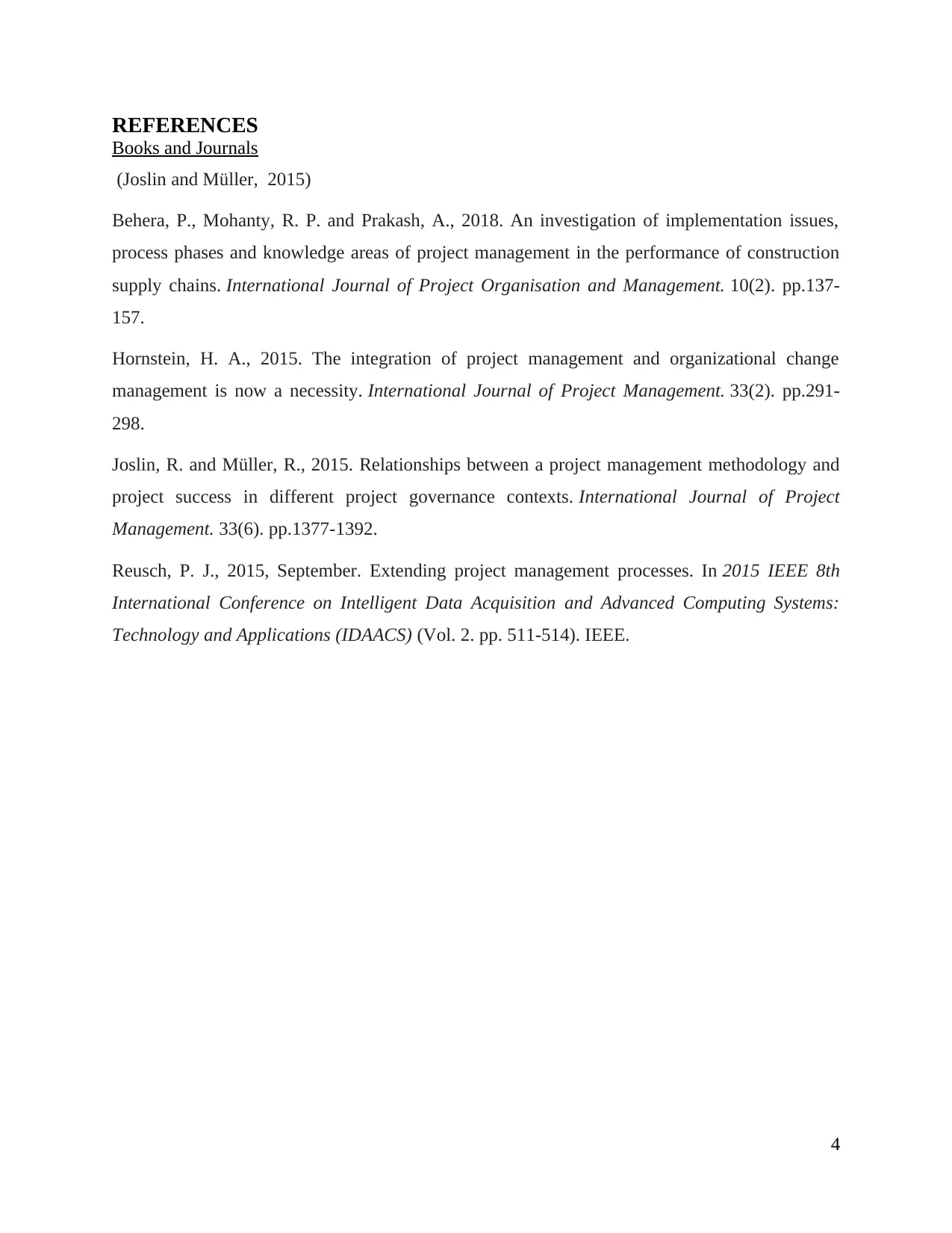
REFERENCES
Books and Journals
(Joslin and Müller, 2015)
Behera, P., Mohanty, R. P. and Prakash, A., 2018. An investigation of implementation issues,
process phases and knowledge areas of project management in the performance of construction
supply chains. International Journal of Project Organisation and Management. 10(2). pp.137-
157.
Hornstein, H. A., 2015. The integration of project management and organizational change
management is now a necessity. International Journal of Project Management. 33(2). pp.291-
298.
Joslin, R. and Müller, R., 2015. Relationships between a project management methodology and
project success in different project governance contexts. International Journal of Project
Management. 33(6). pp.1377-1392.
Reusch, P. J., 2015, September. Extending project management processes. In 2015 IEEE 8th
International Conference on Intelligent Data Acquisition and Advanced Computing Systems:
Technology and Applications (IDAACS) (Vol. 2. pp. 511-514). IEEE.
4
Books and Journals
(Joslin and Müller, 2015)
Behera, P., Mohanty, R. P. and Prakash, A., 2018. An investigation of implementation issues,
process phases and knowledge areas of project management in the performance of construction
supply chains. International Journal of Project Organisation and Management. 10(2). pp.137-
157.
Hornstein, H. A., 2015. The integration of project management and organizational change
management is now a necessity. International Journal of Project Management. 33(2). pp.291-
298.
Joslin, R. and Müller, R., 2015. Relationships between a project management methodology and
project success in different project governance contexts. International Journal of Project
Management. 33(6). pp.1377-1392.
Reusch, P. J., 2015, September. Extending project management processes. In 2015 IEEE 8th
International Conference on Intelligent Data Acquisition and Advanced Computing Systems:
Technology and Applications (IDAACS) (Vol. 2. pp. 511-514). IEEE.
4
⊘ This is a preview!⊘
Do you want full access?
Subscribe today to unlock all pages.

Trusted by 1+ million students worldwide
1 out of 6
Related Documents
Your All-in-One AI-Powered Toolkit for Academic Success.
+13062052269
info@desklib.com
Available 24*7 on WhatsApp / Email
![[object Object]](/_next/static/media/star-bottom.7253800d.svg)
Unlock your academic potential
Copyright © 2020–2026 A2Z Services. All Rights Reserved. Developed and managed by ZUCOL.





